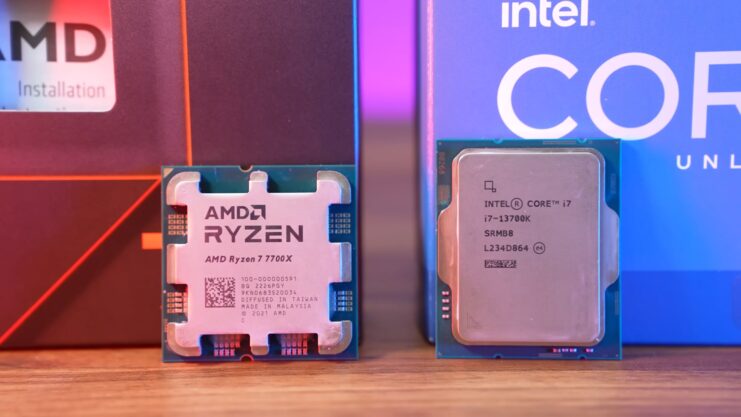When it comes to the heart of a computer, the processor, two names dominate the conversation: AMD and Intel. Their flagship mid-range models, the AMD Ryzen 7 and the Intel i7, have been the subject of intense debate among PC enthusiasts.
Over the course of years, I’ve used processors from both manufacturers, and in this article, I will compare these two powerhouses’ seventh generations and share insights that cater to both the tech-savvy and those new to the world of computing.
If You’re In a Hurry
Below, I’ve prepared a comparison table of some of the most important features of AMD Ryzen 7 and Intel i7 you should have in mind. For more details and analysis, make sure to read on.
| Feature/Aspect | AMD Ryzen 7 | Intel i7 |
| Core and Thread Count | Higher core and thread counts, beneficial for multitasking and multi-threaded applications. | Typically lower core and thread counts, but highly efficient in single-threaded tasks. |
| Clock Speed | Competitive single-thread performance, with notable improvements in recent models. | Historically higher clock speeds, offering an edge in single-threaded tasks. |
| Power Efficiency | More performance per watt, generally cooler operating temperatures. | Potentially higher power consumption and heat generation under load. |
| Integrated Graphics | Generally weaker integrated graphics compared to Intel i7. | Stronger integrated graphics, suitable for basic gaming and media without a dedicated GPU. |
| Overclocking | More headroom for overclocking, offering flexibility for performance tuning. | Supports overclocking, but may offer less flexibility compared to Ryzen 7. |
| Price | Often better price-to-performance ratio, especially in multi-threaded tasks. | Can be more expensive, but justifies cost with higher single-threaded performance and integrated graphics. |
| Motherboard Ecosystem | Consistent socket types, offering easier and more cost-effective upgrades. | Tends to change socket types more frequently, potentially limiting upgrade paths. |
| Future Proofing | Supports newer technologies like PCIe 4.0 and DDR5 RAM, offering a pathway to future upgrades. | Gradual adoption of new standards like PCIe 4.0 and DDR5, but catching up in recent models. |
| Software Optimization | Improved compatibility with modern software, but some older applications may perform better on Intel. | Generally better optimization across a wide range of software, especially older applications. |
| User Experience | User-friendly approach to overclocking and upgrades, with a strong enthusiast community. | Robust support structure, catering well to users prioritizing stability and reliability. |
| Environmental Impact | Focus on energy efficiency, reducing electricity usage and heat output. | Also focusing on efficiency, but with a mixed record in terms of environmental impact. |
Needless to say, the seventh generation of these processors, although mid-range, still holds excellently in 2024. The fact that even AMD Ryzen 5 and Intel i5 still do the job nowadays speaks volumes about how great these CPUs actually are. With that said, let’s further explore details regarding Ryzen 7 and i7.
Core and Thread Counts
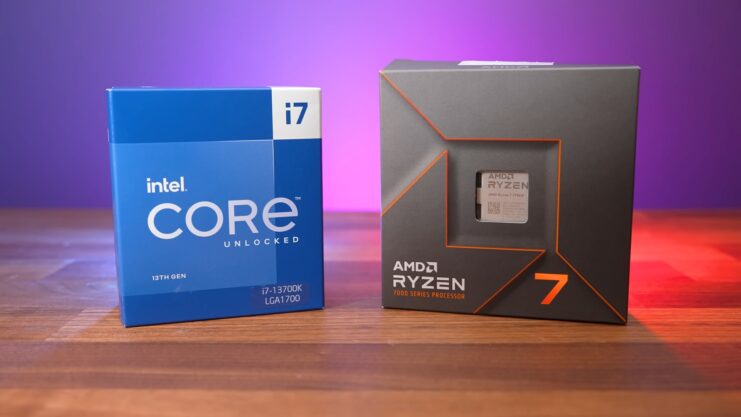
At the core of any processor comparison are, well, the cores and threads. These elements are crucial for understanding a CPU’s performance. The Ryzen 7 and Intel i7 series have evolved over the years, consistently enhancing their core and thread counts.
This increase directly impacts multitasking abilities and performance in demanding applications.
Ryzen 7 processors typically offer higher core and thread counts compared to their Intel i7 counterparts. This difference becomes more pronounced in tasks like video editing, 3D rendering, and other multi-threaded applications.
However, it’s important to note that higher core counts don’t always translate to better performance in every scenario.
Clock Speeds and Performance
Clock speed, measured in GHz, is another critical factor. It indicates how many cycles a CPU can execute per second, directly influencing how quickly it can process information. Both AMD and Intel have made significant strides in this area, but their approaches differ.
Historically, Intel i7 chips have had a slight edge in clock speeds, especially in single-threaded tasks. This means they may perform better in applications that don’t effectively utilize multiple cores and threads.
However, Ryzen 7 processors have substantially closed this gap, offering competitive single-thread performance while excelling in multi-threaded environments.
The Balance Between Performance and Efficiency
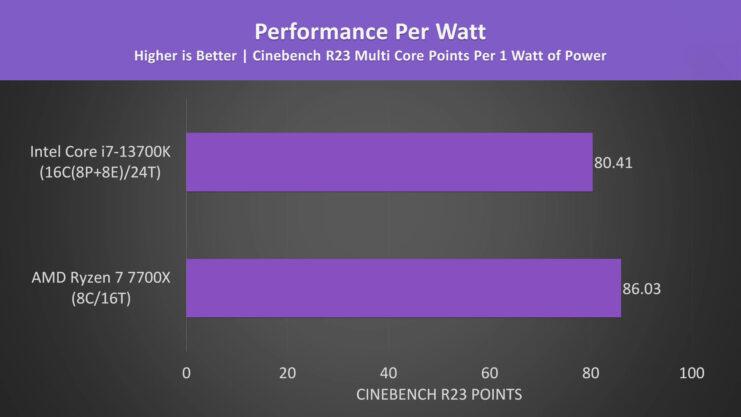
Power efficiency is a vital aspect, impacting not only electricity consumption but also heat generation. Efficient CPUs tend to run cooler, which is beneficial for system longevity and performance.
Ryzen 7 CPUs are known for their efficient architecture, often delivering more performance per watt than their Intel counterparts.
This efficiency translates to cooler operating temperatures, which is a significant advantage for users who prioritize a quiet and cool-running PC. Intel i7 processors, while powerful, can sometimes generate more heat, especially under load.
Integrated Graphics and Gaming Performance
Integrated graphics are crucial for users who don’t have a dedicated graphics card. They handle everything from basic display functions to light gaming and video playback.
Intel’s i7 processors generally offer stronger integrated graphics compared to Ryzen 7 CPUs. This advantage makes them a preferred choice for users needing decent graphics performance without an external GPU.
However, for serious gaming or professional graphics work, a dedicated graphics card is recommended, reducing the impact of this difference.
Overclocking Capabilities
Overclocking allows users to push their CPUs beyond the manufacturer’s specified speeds, potentially enhancing performance. However, it requires a good understanding of computer hardware and adequate cooling solutions.
Both Ryzen 7 and Intel i7 processors offer overclocking capabilities, but Ryzen often provides more headroom for overclocking. This flexibility is a boon for enthusiasts who enjoy tweaking their systems for maximum performance.
Price and Value Proposition
Price is a crucial consideration. The best choice often depends on getting the most value for your money.
Which Offers Better Value?
Ryzen 7 processors typically offer a better price-to-performance ratio, especially in multi-threaded tasks. Intel i7 CPUs, while sometimes more expensive, justify their cost with higher single-threaded performance and better integrated graphics. Your choice should align with your specific needs and budget.
Compatibility and Ecosystem
The motherboard ecosystem is a vital factor, as it determines future upgrade paths and compatibility with other components.
AMD has been consistent with its socket types, often allowing users to upgrade their CPUs without needing a new motherboard. This approach offers a clear upgrade path and is cost-effective in the long run.
Intel, while offering robust performance, tends to change socket types more frequently, which can limit upgrade options and increase long-term costs.
Future Proofing and Technology Support
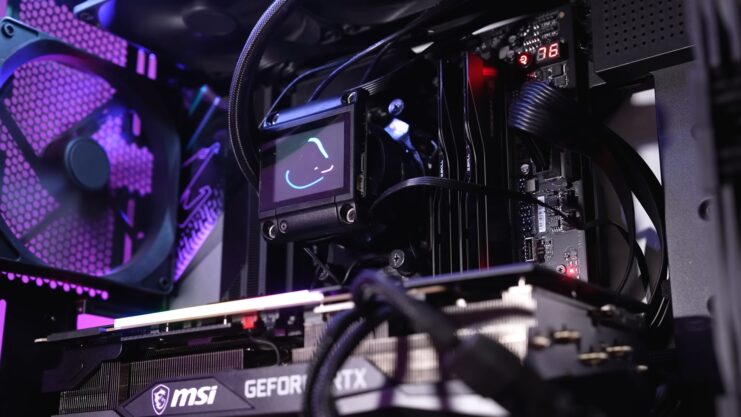
In the ever-evolving world of technology, future-proofing your investment is crucial. This includes considering support for the latest technologies and how long a processor is likely to remain relevant.
Ryzen processors often come with support for newer technologies like PCIe 4.0 and DDR4, and now DDR5 RAM, offering a pathway to future upgrades. Intel has been a bit slower in adopting these new standards but has made significant progress in its latest models.
Choosing a CPU that supports these technologies is essential for those who want to keep their systems up-to-date for as long as possible.
Software Optimization and Compatibility
Software optimization plays a crucial role in determining the actual performance of a CPU. How well a processor works with various software types can impact its overall effectiveness.
Intel CPUs generally have better optimization with a wide range of software, especially older applications. This is due to their long-standing presence in the market.
AMD has made considerable strides in this area, but some software, particularly older titles, may still perform better on Intel chips.
User Experience and Community Support

Beyond the technical specifications, the user experience, which includes ease of installation, customer support, and community resources, is vital for many users.
Both AMD and Intel offer robust user communities and support systems. However, AMD’s user-friendly approach to overclocking and upgrades, along with its enthusiastic community, might be more appealing to users who enjoy customizing their setups.
Intel’s support structure is also comprehensive, catering well to users who prioritize stability and reliability.
Environmental Impact and Sustainability
In today’s world, the environmental impact of technology cannot be ignored. This includes the energy efficiency of processors and the sustainability practices of the companies that produce them.
AMD has made notable efforts in producing energy-efficient CPUs, which not only reduce electricity usage but also minimize heat output. Intel, while also focusing on efficiency, has had a mixed track record in this area.
Consumers increasingly consider these factors when making their purchasing decisions.
FAQs
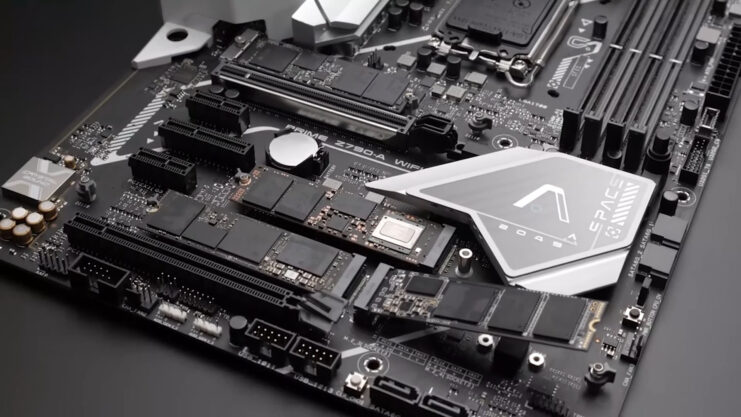
Can I use the same motherboard if I switch from an Intel i7 to an AMD Ryzen 7 processor?
No, you cannot use the same motherboard when switching between Intel i7 and AMD Ryzen 7 processors. They require different socket types and chipsets.
For instance, Ryzen 7 typically uses the AM4 socket, while Intel i7 processors might use LGA 1151 or LGA 1200 sockets, depending on the generation.
How does the memory compatibility differ between Ryzen 7 and Intel i7 CPUs?
Ryzen 7 processors often have a broader range of compatibility with different types of RAM, especially with higher-speed memory, which can provide a significant performance boost.
Intel i7 processors also support high-speed memory but may not benefit as much from extremely high-speed RAM compared to Ryzen.
Are there any differences in warranty terms between AMD Ryzen 7 and Intel i7 processors?
Warranty terms can vary based on the specific model and region. However, both AMD and Intel generally offer a 3-year limited warranty for their CPUs.
It’s important to check the specific warranty terms for the processor you are purchasing.
For a user primarily interested in gaming, which processor would be the better choice?
For gaming, both processors can perform exceptionally well. The Intel i7 might have a slight edge in games that rely more on single-threaded performance.
However, Ryzen 7 processors offer excellent performance, particularly in newer games optimized for multiple cores.
How do Ryzen 7 and Intel i7 CPUs compare in virtualization support for tasks like running VMs?
Both Ryzen 7 and Intel i7 processors offer robust support for virtualization. Ryzen CPUs are often favored for their higher core and thread counts, which can be beneficial in managing multiple virtual machines.
Intel i7 processors also perform well in virtualization tasks but may be more suitable for fewer, more intensive VMs.
Is there a significant difference in audio processing capabilities between the two CPUs?
In terms of audio processing, the difference between Ryzen 7 and Intel i7 CPUs is generally minimal, as audio processing is not as demanding as other tasks like video editing or gaming.
Both processors are capable of handling audio production tasks efficiently, with the choice depending more on other system components like the sound card and RAM.
Final Words
Choosing between the AMD Ryzen 7 and Intel i7 processors depends on a variety of factors. For those prioritizing multi-threaded performance and future-proofing, Ryzen 7 is an excellent choice. On the other hand, Intel i7 chips shine in single-threaded tasks and offer better integrated graphics.
Ultimately, the decision should be based on personal needs, budget, and long-term plans. Both processors have their strengths, and understanding these can help you make an informed decision that suits your specific requirements.

